 Petzlover
Petzlover Irish Terrier is originated from Ireland but Parson Russell Terrier is originated from United Kingdom. Irish Terrier may grow 14 cm / 6 inches higher than Parson Russell Terrier. Both Irish Terrier and Parson Russell Terrier are having almost same weight. Both Irish Terrier and Parson Russell Terrier has same life span. Both Irish Terrier and Parson Russell Terrier has almost same litter size. Both Irish Terrier and Parson Russell Terrier requires Moderate Maintenance.
Irish Terrier is originated from Ireland but Parson Russell Terrier is originated from United Kingdom. Irish Terrier may grow 14 cm / 6 inches higher than Parson Russell Terrier. Both Irish Terrier and Parson Russell Terrier are having almost same weight. Both Irish Terrier and Parson Russell Terrier has same life span. Both Irish Terrier and Parson Russell Terrier has almost same litter size. Both Irish Terrier and Parson Russell Terrier requires Moderate Maintenance.
 The Irish Terrier is a dog breed from Ireland and one of the many different terrier breeds there are.
The Irish Terrier is a dog breed from Ireland and one of the many different terrier breeds there are.
Nobody is too sure of the Irish Terrier's history but it is one of the oldest terrier breeds. It appears as if the dog breed was developed from a wheat colored terrier and the extinct black and tan terrier.
It was always a common practice to crop the ears of terriers, but in 1889 the Irish Terrier Club required that the ears remain uncropped. The first Irish Terrier was shown in 1881, and the first Irish Terrier registered with the American Kennel Club was in 1885. The Irish Terrier Club of America was founded in 1896.
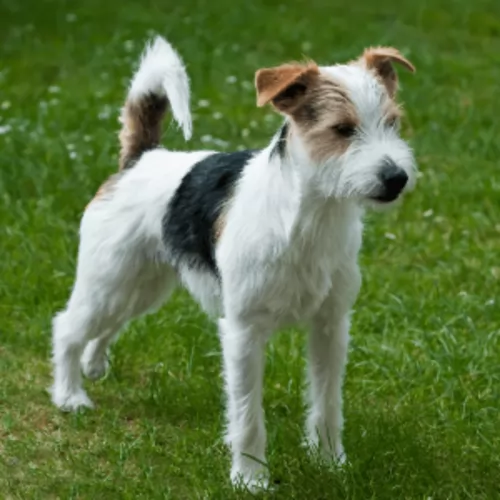 The Parson Russell Terrier hails from England and is a small to medium sized dog dating back to the 18th century. It is believed that Reverend John ‘Jack’ Russell was the developer of this dog. The Parson has always been involved with England’s sport of foxhunting.
The Parson Russell Terrier hails from England and is a small to medium sized dog dating back to the 18th century. It is believed that Reverend John ‘Jack’ Russell was the developer of this dog. The Parson has always been involved with England’s sport of foxhunting.
They’re spritely and quick and have been able to keep up on a hunt and take on a fox in its lair. The dog was first recognized in 1990 in the United Kingdom as the Parson Jack Russell Terrier and in America in 1997.
All the top kennel clubs recognize this dog as the Parson Jack Russell Terrier.
 The Irish Terrier is a medium sized dog who stands between 45cm and 50cm and weighs in the region of 11 to 12kg. He has a short, dense, wiry double coat which is a red, golden, sandy, wheaten color.
The Irish Terrier is a medium sized dog who stands between 45cm and 50cm and weighs in the region of 11 to 12kg. He has a short, dense, wiry double coat which is a red, golden, sandy, wheaten color.
The ears of the dog are semi-erect/semi-floppy and the tail is held high and curved.The chest is deep and muscular and the front and back legs are strong, long and muscular.
The Irish Terrier is a companion dog today, even though he was once a guard- and hunting dog. He is an amicable dog while also being alert and active. He is also independent and strong-willed so he will require training and socialization as then he becomes obedient and relaxed and much easier to live with.
They're social dogs too, loving all the members of their human family, getting on well with children in the home.
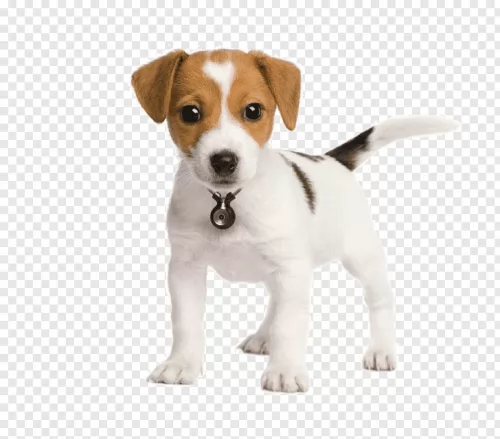 The Parson Jack Russell is essentially a white dog with black and tan or orange-fawn patches. He can be tri-colored too. The coat is either smooth, rough or broken.
The Parson Jack Russell is essentially a white dog with black and tan or orange-fawn patches. He can be tri-colored too. The coat is either smooth, rough or broken.
He stands at between 33–36cm tall at the withers and weighs between 5 and 8kg. Unlike the Jack Russell, the Parson Russell Terrier has longer legs. He has some longer hair on the head, legs and body. The ears are floppy wit the tip pointed forward. The tail has always been docked but when left long it it held high, slightly curving over the back.
Feisty, brave, cheeky and alert, the Parson Russell Terrier is an energetic dog who gets on well with children as he knows that this is essentially where his games come from.
He is bold and clever and you’ll be able to have him trained and socialized without any trouble. These little dogs are full of life and they are protective of their humans and their property, making excellent watchdogs.
 Irish Terriers are good with people and want to be an active member of their human families.
Irish Terriers are good with people and want to be an active member of their human families.
They are active dogs and will require ongoing mental and physical stimulation. This is a lively dog, but he still loves to spend quiet time indoors with his family.
They’re intelligent dogs with a strong sense of loyalty towards their owner, making excellent family pets.
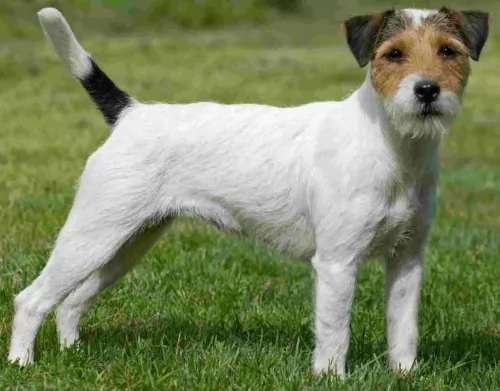 In general the Parson is a friendly,loving dog, fairly small but packed full of feisty personality.
In general the Parson is a friendly,loving dog, fairly small but packed full of feisty personality.
They make excellent pets for the entire family. He is an intelligent dog, but typical of most terriers he can be stubborn, but this can easily be fixed with training and socialization. With good care, he’ll make you a wonderful little pet and companion.
 The Irish Terrier is a healthy dog breed and you won't find yourself running to the vet often with him, but still he can land up with one of the common dog problems.
The Irish Terrier is a healthy dog breed and you won't find yourself running to the vet often with him, but still he can land up with one of the common dog problems.
It is always wise to be aware of hip dysplasia as this is a disease which can occur in all dog breeds and all dog ages. Also look out for eye diseases such as progressive retinal atrophy and cataracts as these can lead to blindness in your pet.
There is a disease known as cystinuria which is quite a concern with Irish Terriers. It’s an inherited kidney disease where increased amounts of arginine, lysine, amino acids cystine and ornithine are excreted in the urine.
In well-functioning kidneys, blood is filtered so as to create urine. Cystine is reabsorbed back into the bloodstream but with dogs affected with cystinuria they cannot reabsorb cystine back in their bloodstream, causing an accumulation in the urine. Dogs with cystinuria suffer inflammation of the urinary tract and can also develop urinary blockage and kidney failure. Immediate veterinary intervention is required.
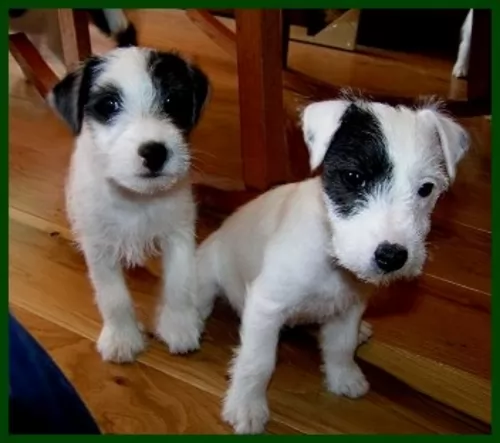 Your Parson Jack Russell can live to be between 12 and 15 years but nonetheless he does have some breed-related health issues to watch for.
Your Parson Jack Russell can live to be between 12 and 15 years but nonetheless he does have some breed-related health issues to watch for.
Eye conditions which can affect this dog include primary lens luxation,cataracts, corneal dystrophy and progressive retinal atrophy. With cataracts the lens of the eye develops a cloudy look resulting in poorer vision and sometimes blindness. Cataract surgery is available for dogs.
Your Parson Jack Russel should be lean and muscular and always full of energy. Avoid feeding him unhealthy treats which can lead to obesity and other health problems.
All kinds of parasites such as ticks, fleas and worms can invade your dog’s body. Roundworms, hookworms and tapeworms can cause havoc with their health and some of these parasites can even be transmitted to humans. It’s why it is important to get your puppy to the vet to be de-wormed and to get his first injections.
A liver disorder known as portosystemic shunt can mean that some of the blood supply doesn’t get to the liver and it doesn’t function properly. This will mean the liver can’t remove toxins from the bloodstream effectively.
 The coat of the Irish Terrier requires a brush twice a week to keep it bright. If you intend showing your dog, the coat will need to be stripped a couple of times a year to maintain the texture and color.
The coat of the Irish Terrier requires a brush twice a week to keep it bright. If you intend showing your dog, the coat will need to be stripped a couple of times a year to maintain the texture and color.
Other Irish Terrier owners take their dog to the groomers to have the coat clipped. The dog doesn't shed a lot and they are referred to as being somewhat hypoallergenic.
As with any other dog breed, other grooming needs with your Irish Terrier will include clipping the nails, checking his teeth for plaque build-up and checking inside the ears for infection.
If you're unsure how to perform these grooming procedures with your pet, simply ask your vet who will explain to you precisely how to ensure your dog remains in tip top condition.
He's a fairly active dog so you want to make sure that you are attending to his exercise needs. Take him for a walk every day, and if you've got a good sized garden, throw a ball for him. If you're a jogger you can count him in.
What you feed your Irish Terrier will depend a lot on his age and his activity levels. Every dog is a unique individual and nothing is set in stone regarding their diets. Just like people though, feeding him a lot of junk food will contribute to illness and shorten his lifespan.
He needs quality food. If you buy commercially manufactured food, make sure to read up on how much to feed him. Try and mix in some cooked chicken, brown rice and vegetables from time to time as well as some raw meat.
Learn to know what foods are toxic for him. Make sure he has a bowl of fresh, cool water constantly available to him.
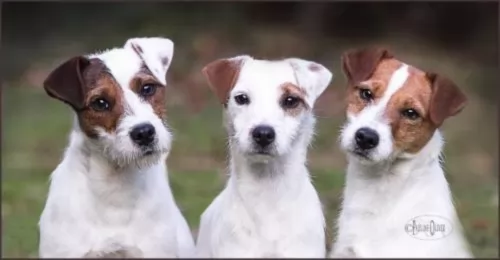 The Parson Russell Terrier has different coat types – the smooth and rough and both will require regular brushing. Rough coats will require plucking or clipping to avoid matting.
The Parson Russell Terrier has different coat types – the smooth and rough and both will require regular brushing. Rough coats will require plucking or clipping to avoid matting.
Check his eyes and ears regularly. Look inside his ears for excess wax and dirt which could lead to an ear infection. His nails should also be trimmed.
The best thing you can do for your Parson Russell Terrier if you don’t want your pet producing puppies is to have it spayed or neutered. Spaying for females or neutering for males decreases the likelihood of certain types of cancers too so it can be beneficial.
Diet is hugely important for a Parson Russell Terrier and the food you decide for him can impact his health. Many time those ‘treats’ you feed your pet do nothing more but give him a stomach ache.
It's tempting to pop chocolates, popcorn, nuts and ice cream into your pets mouth when he is so adorable but in the long run it is shortening his life. All he basically requires and needs is a simple, consistent diet of the top commercially manufactured foods mixed with some tasty home made food from time to time.
Boiled chicken, brown rice and vegetables such as sweet potatoes, carrots and spinach will do your pet wonders. Ensure he always has fresh, cool water available to him.